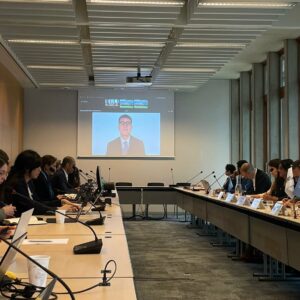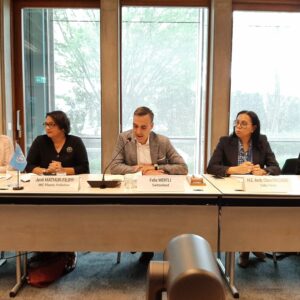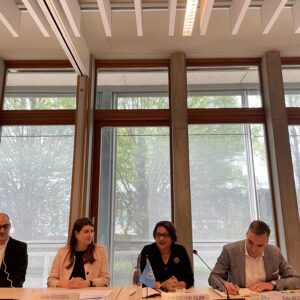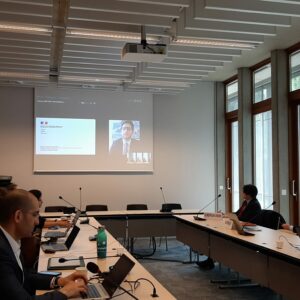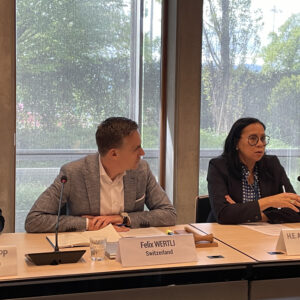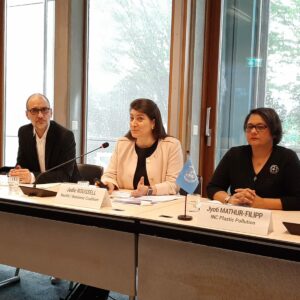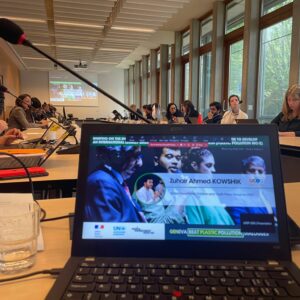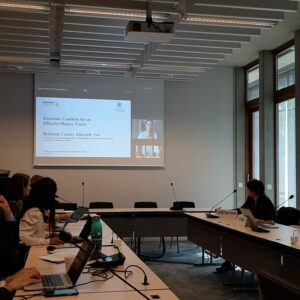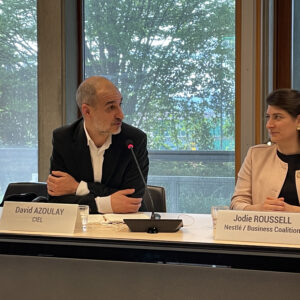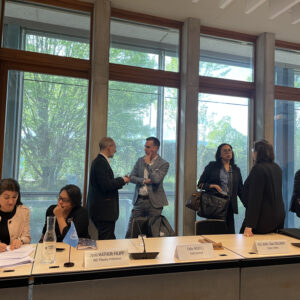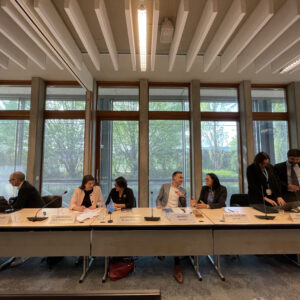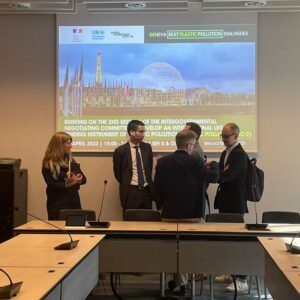Event Conference
Briefing on the 2nd Session of the Intergovernmental Negotiating Committee to Develop an International Legally Binding Instrument on Plastic Pollution (Plastic Pollution INC-2)

27 Apr 2023
15:00–16:30
Venue: International Environment House II & Online | Webex
Organization: Geneva Environment Network
This briefing on the second session of the Intergovernmental Negotiating Committee to develop an international legally binding instrument on plastic pollution, including in the marine environment (INC-2) to take place from 29 May to 2 June 2023 at the United Nations Educational, Scientific and Cultural Organization (UNESCO) Headquarters in Paris, France, was held within the framework of the Geneva Beat Plastic Pollution Dialogues.

About this Event
The United Nations Environment Assembly made history in March 2022, by adopting a resolution setting up the path to a global treaty to end plastic pollution. The resolution requests the convening of an intergovernmental negotiating committee to develop an international legally binding instrument on plastic pollution, including in the marine environment, during the second half of 2022, with the ambition of completing its work by the end of 2024.
Rather than the end of the journey, this resolution represents a new turning point, from which much work still has to be done. Through the Geneva Beat Plastic Pollution Dialogues, the Geneva Environment Network and its partners support actors in the Geneva community and beyond, engaged in this process.
In 2022, the first two meetings for the development of the international legally binding agreement on plastic pollution took place. In May, the ad hoc open-ended working group met in Dakar, Senegal. The meeting resulted in a proposed draft rules of procedure for the work of the INC. Member States then met in Punta del Este, Uruguay, from 28 November to 2 December for the first meeting of the INC to develop an international legally binding instrument on plastic pollution.
The second session of the Intergovernmental Negotiating Committee will take place from 29 May to 2 June 2023 at UNESCO Headquarters in Paris, France. The meeting will be preceded by regional consultations on 28 May 2023, at the same venue.
This event held a few weeks ahead of the INC-2 session in Paris provided updates on the preparations of this important event and stakeholders’ perspectives on the process. The briefing, organized in partnership with France within the framework of the Geneva Beat Plastic Pollution Dialogues, took stock of the options for elements document recently released by the INC Secretariat and set the tone for what negotiations in Paris will address.
The Geneva Beat Plastic Pollution Dialogues

The world is facing a plastic crisis, the status quo is not an option. Plastic pollution is a serious issue of global concern which requires an urgent and international response involving all relevant actors at different levels. Many initiatives, projects and governance responses and options have been developed to tackle this major environmental problem, but we are still unable to cope with the amount of plastic we generate. In addition, there is a lack of coordination which can better lead to a more effective and efficient response.
Various actors in Geneva are engaged in rethinking the way we manufacture, use, trade and manage plastics. The Geneva Beat Plastic Pollution Dialogues aim at outreaching and creating synergies among these actors, highlighting efforts made by intergovernmental organizations, governments, businesses, the scientific community, civil society and individuals in the hope of informing and creating synergies and coordinated actions. The dialogues highlight what the different stakeholders in Geneva and beyond have achieved at all levels, present the latest research and governance options.
Following the landmark resolution adopted at UNEA-5 to end plastic pollution and building on the outcomes of the first two series, the third series of dialogues will encourage increased engagement of the Geneva community with future negotiations on the matter. These include the meetings of the Intergovernmental Negotiating Committee from the second half of 2022 to 2024, as well as preparatory meetings within the ad-hoc open-ended working group during the first half of 2022. The series also continues to foster stronger cooperation and coordinated actions ahead of other milestones in the environmental agenda, including the BRS COPs, SAICM ICCM5, the UN Ocean Conference, UNEA-6 and other processes in Geneva, such as at the WTO.
Speakers
By order of intervention.
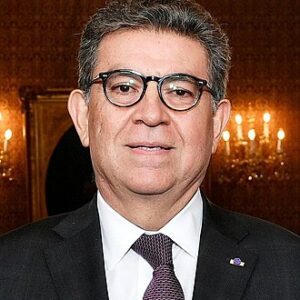
H.E. Amb. Gustavo MEZA-CUADRA
Chair, INC Plastic Pollution | Peru

Jyoti MATHUR-FILIPP
Executive Secretary, INC Plastic Pollution Secretariat

Hugo LEQUERTIER
France's Focal Point for INC Plastic Pollution

H.E. Amb. Clara Manuela da Luz DELGADO JESUS
Permanent Representative of Cabo Verde to the United Nations Office in Geneva, Member of the High Ambition Coalition to End Plastic Pollution

Jodie ROUSSELL
Global Public Affairs Lead, Packaging & Sustainability, Nestlé | Member of the Business Coalition for a Global Plastics Treaty

Zuhair Ahmed KOWSHIK
Global Focal Point, Children and Youth Major Group to UNEP

Bethanie CARNEY ALMROTH
Professor at Gothenburg University | Member of the Steering Committee of the Scientists’ Coalition for an Effective Plastics Treaty

David AZOULAY
Director of the Geneva Office and of the Environmental Health Program, CIEL
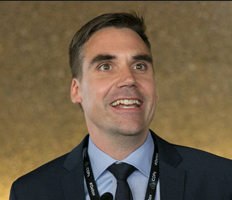
Felix WERTLI
Head, Global Affairs Section, Federal Office for the Environment, Switzerland
Summary
Opening Remarks
H.E. Amb. Gustavo MEZA-CUADRA | Chair, INC Plastic Pollution | Peru
- Today’s gathering represents an important opportunity to reflect on our progress since the adoption of the United Nations Environment Assembly resolution 5/14 in March 2022, which seeks to tackle the plastic pollution challenge and its growing consequences on human health and deep implications with the triple planetary crisis of climate change, biodiversity loss and pollution.
- The mandate to develop a legally binding instrument to end plastic pollution by the end of 2024 recalls the urgency of our response as the challenge continues to aggravate at a staggering pace.
- Half of globally manufactured plastics have been made in the last fifteen years and production is expected to double by 2050, while we only recycle 10 percent of it.
- We need to act quickly and decisively. The INC-2 meeting will constitute an important stepping stone towards an agreement to address this challenge.
- My broad vision for the agreement is for it to be:
- a multilateral instrument – due to the transboundary nature of plastic and plastic pollution;
- covering the entire life cycle of plastics;
- containing both core obligations and control measures complemented by equally ambitious voluntary measures, means of implementation and incentive mechanisms; and
- inclusive by design, considering the need for developing states and able to guarantee a just transition.
- The negotiating process needs to recognize that, while many plastics have benefic uses in different sectors, plastics are manufactured from different polymers, and chemicals, and have different types of use, externalities and end-of-life- cycles. They should not be addressed in the same manner in our instrument, which would be geared towards reducing the size of the problem by tackling problematic and unnecessary plastic, including single-use and ensuring that the plastics that enter the market are not harmful, guaranteeing that they are recyclable, reusable and repairable by design within circular economic systems.
- Waste should be our last option and when it happens, it must be done in a safe and environmentally sound manner.
- We need to address legacy plastic, including fishing gear.
- We need a strong treaty on plastic pollution with ambitious goals, but equally ambitious means of implementation. This will ensure the effective protection and conservation of the environment and the guarantee of the human right to a clean, healthy and sustainable environment.
- Time for negotiations is short, but this should not lead us to settle for a weak agreement. Not only because it is the right thing to do, but also because it is our biggest intergenerational responsibility.
- Over the past month, the Secretariat has been working in consultation with me on the potential options for elements paper. This paper, drafted on the member states positions and expectations, will prove to be an important tool to inform our discussions at INC-2, and it will allow us to swiftly identify significant areas of consensus to obtain a mandate for the drafting of a zero-draft agreement for INC-3.
- Discussions in Paris will also lead us to the identification of areas where further work is necessary for the next intersectional period.
- We, Member States will not be able to face the challenge alone. We need the involvement of the different stakeholders of this process, including amongst others, private sector innovators, think tanks, universities, and informal waste pickers. They will feed us with the existing frontier collective intelligence. Giving us the opportunity to connect the dots between already existing brilliant initiatives but also channel our efforts to conceive an agreement that is just and implementable.
- The success of the stakeholders’ submissions and intersessional webinars invite us to continue innovating to better include valuable inputs as we move forward.
- The involvement of these stakeholders will also be the cornerstone of our multi-stakeholder action agenda, which experience has shown to be an important pillar in support of this type of agreements.
- Count on me as your main ally in this process and do not hesitate to reach out.
Update on Preparations for INC-2
Jyoti MATHUR-FILIPP | Executive Secretary, INC Plastic Pollution Secretariat
Timeline of the INC Process
- The INC Secretariat has a little over two and a half years to conclude the negotiations on a legally binding agreement on plastic pollution. The first meeting, or INC-1, took place in November 2022 in Punta del Este, Uruguay, and INC-2 will soon take place from 29 May to 2 June 2023 in Paris. INC-3 is planned for November, in Kenya.
- Considering the intensity of the work to be covered at each of the sessions, the INC process will unfold as five ‘mini’ Conferences of the Parties (COPs).
- Offers to host INC-4 and INC-5, to take place in 2024, have been put forward by Canada and the Republic of and this should be decided hopefully at INC-2.
- A document recently released by the Secretariat offers an overview of the dates and venues of subsequent sessions of the intergovernmental negotiating committee.
Update on Preparations for INC-2
Registration
Figures presented by INC Secretariat on 27 April 2023 might be subject to changes. For the most updated version, consulting the official INC-2 website is advised.
- Registrations to participate closed on 28 April 2023. Registered participants include:
- 153 Member States with a total of 511 delegates.
- 639 organizations
- 1198 delegates
- 15 UN entities, with 54 delegates
- 7 IGOs with 17 delegates
- 28 media organizations with 31 delegates
- In total, 1811 delegates registered.
Logistics
- The venue of INC-2, UNESCO headquarters, has a limit of venue space limit of 1500 delegates, reason for which the Secretariat will be issuing secondary badges.
- The Secretariat provided two funded delegates support to every eligible member state. As of now, 234 delegates have requested support, and the Secretariat is providing funding for 20 stakeholders to attend.
- We have to make Paris count. We need to have vision and leadership in Paris. It is a critical opportunity for members to deliberate and decide between all the possible options.
- The discussions in Paris will be based on the Options Paper and follow the guidelines traced in the scenario note prepared by the Chair.
- The Secretariat has decided to spend less time on general statements, which will allow us to move swiftly to negotiating substance. There will not be general statements at the opening of the meeting, but when discussing agenda item four, which is the legally binding instrument.
- INC-2 also has to determine the mandate for INC-3. Depending on Member States’ decisions, it could possibly include the mandate to the Secretary and the chair to develop a zero-draft of the legally-binding document.
Documents
- All information and working documents prepared by the Secretariat ahead of INC-2 are now available in all UN languages.
- The Secretariat is also putting together some information documents to allow a faster consultation of working and information documents on the Conduct of Voting.
Thematic Side Events
- There will be twelve thematic side events during INC-2.
- As of 27 April 2023, 197 requests to join have been delivered to the INC Secretariat.
- Organizations that have submitted their requests to organize those events will be informed in the following week.
Options Paper
- At INC-2, the Secretariat was mandated to develop the options for elements paper in consultation with the INC chair.
- The document, released in April 2023, had to be based on a comprehensive approach that addresses the full life cycle of plastics as called for by the UNEA resolution and it had to include identifying the objective, substantive provisions, including core obligations, control measures, voluntary approaches, implementation measures, means of implementation and written submissions, which can be consulted on the INC-2 website.
Webinars
- The Secretariat will host a series of six technical webinars, taking place in the first two weeks of May 2023. These will address:
- Webinar 1: Technical briefing on the Potential Options for Elements document | 4 May 2023 | 14:00-15:00 CEST
- Webinar 2: Science informing decision-making | 4 May 2023 | 15:00-16:30 CEST
- Webinar 3 Technical briefing on the organization of work at INC-2 | 8 May 2023 | 15:00 – 16:00 CEST
- Webinar 4: Control measures for sustainable consumption and production: addressing unnecessary and problematic plastics, including single-use or short-lived plastics and plastic products, and shifting to sustainable alternatives | 10 May 2023 | 13:00 – 14:30 CEST
- Webinar 5: Means of implementation, with a special focus on resource mobilization and financial mechanisms | 11 May 2023 | 13:00-14:30 CEST
- Webinar 6: Promoting a circular economy to reduce the size of the problem: a focus on Extended Producer Responsibility ( EPR ) and addressing plastic waste | 16 May 2023 | 12:00-13:30 CEST
Hugo LEQUERTIER | France’s Focal Point for INC Plastic Pollution
- Plastics is a major issue and it represents a major problem for the environment and human health at the current rate, with prospects of the amount of plastic waste produced in the world to l triple by 2060.
- France welcomes the adoption of UN Environment Assembly resolution 5/14 to develop a legally binding instrument in plastic pollution and is honoured to continue this momentum and to host the second session of the negotiations.
Organization of the Second Session of the INC
- This session of negotiations will take place at UNESCO headquarters in Paris, located in the XV arrondissement, which is located a few steps from the Eiffel Tower.
- The meeting will be held in person only with the video broadcast via YouTube for the plenary rooms.
- This meeting will be guaranteed plastic free and the UNESCO headquarter is easily accessible by bus or metro.
- INC-2 will officially begin on 29 May and end on 2 June 2023 and it will be preceded by regional consultations taking place on Sunday, 28 May.
- High-level events, not part of the official INC-2 process, will also take place on 26 and 27 May. These are entirely organized and funded by France and aim to maintain high-level political attention on plastic pollution and to discuss some solutions to address the issue ahead of the opening of INC-2.
- The purpose of these events is also to enable interactive discussions between high and low state representatives. Therefore, we have decided to invite only a limited number of ministers of the environment.
- Invited countries may have received already the letter of invitation or will soon receive it through France’s embassies.
- We have received clear instructions from UNESCO as to the number of people who can be at the conference site simultaneously. This number is limited to 1500 delegates to respect the evacuation rules of the building.
- After the registration procedure will close on 28 April, the number of floating badges will be determined.
- Delegates must submit their VISA applications as soon as possible, no later than four weeks before the opening of INC-2, which is 28 April 2023. A VISA must be obtained in advance and cannot be issued open arrival in France. Delegates are invited to consult France’s VISA website and the Information Note circulated by the Secretariat.
Criteria of Success from France’s Perspective
- As a host country, we have high expectations for this session. We hope that it will lead to substantial progress in the negotiations.
- INC-1 devoted a significant amount of time to procedure issues. Some issues remained unsolved, including the question of the adoption of the rules of procedures and the election of the bureau, as well as the decision on the date and place of the next negotiating sessions. We hope that these issues will be resolved in the early hours of INC-2.
- We understand that in the event of persistent lockage, a vote could be held on maybe on the first day, including on the election of the Bureau.
- As the host country, we are vigilant that this option is logically granted so that substantive discussions can then begin quickly and can continue ideally in contact groups.
- We hope that initial lines of convergence will be emerging during INC- 2 and we are confident that significant progress can be made in Paris on the objectives and scope of the future treaty, as well as on the binding measures, obligations and the means of implementation that it will contain.
- Together with the European Union and its member states, France has strong ambitions for this treaty. We advocate for a coherent set of measures covering the entire life cycle of plastics, including:
- targets for reducing the overall supply of plastics,
- bans on problematic and unnecessary polymers, chemicals, and plastic products;
- eco-design criteria and standards for producers;
- global targets on reuse in cooperation with recycled material collection and recycling;
- the promotion or even the obligation to set up extended producer responsibility, transparency and consumer information obligations.
- As the host country, we hope that this meeting will allow the adoption of a decision that will mandate the chair of the committee to draft a first version of the text of the agreement by INC-3,
- Our timetable is ambitious. UNEA Resolution 5/14 specifies that an agreement under Treaty must be reached by the end of 2024. We must move quickly into the substantive negotiations and move towards consensus.
Stakeholders Perspectives
Ambition to End Plastic Pollution
H.E. Amb. Clara Manuela da Luz DELGADO JESUS | Permanent Representative of Cabo Verde to the United Nations Office in Geneva, Member of the High Ambition Coalition to End Plastic Pollution
- Plastic pollution is an important matter that affects all nations, particularly Cabo Verde as a small island developing state (SIDS). SIDS are highly vulnerable to the impacts of plastic pollution, especially in the marine environment.
- The development of an international legally binding instrument on plastic pollution, including in the marine environment, is likely to have significant implications for Cabo Verde.
- In my statement made on 2 November 2022, when announcing Cabo Verde’s decision to join the High Ambition Coalition to End Plastic Pollution, I emphasized that we face the same challenges as many other countries whose coastal areas are affected by the impact of plastic pollution, toxic chemical and plastic waste, which are detrimental to our livelihoods and economies.
- Plastic trash is so abundant on our shores that we can now find birds breathing plastics, mostly fishing nets, and baby sea turtles after hatching getting tangled up in fishing nets washing ashore, and fish full of microplastics.
- In Cabo Verde, the trend of single-use plastics is relatively recent, so we approved a law that makes imports of single-use plastics stricter, as the country is plagued by those that wash ashore from other countries.
- Cabo Verde only recently opened the first recycling centre on the Island of São Vicente to cope with the amount of waste that reaches the country, since recycling was not previously possible, but recycling remains in the hands of a few nonprofit organizations.
- Cabo Verde is trying to do a good job to clean these beaches frequented by tourists, as tourism represents 25% of our GDP and 10% of formal employment.
Any domestic action or local initiative to clean our beaches and fight plastic pollution has been demonstrated to be insufficient. To global problems, we need global responses.
- SIDS have been tremendously impacted by plastic pollution. An ambitious and effective treaty will ultimately depend on our participation in the negotiation and how we harness action and expertise from other processes and bring together regions through collective action across the United Nations system initiatives.
- By participating in the intergovernmental negotiating committee, we will have the opportunity to contribute to the development of this global treaty and advocate for measures to reduce plastic pollution not only in our waters but in the other waters of all the countries part of the High Ambition Coalition.
- The outcome of this negotiation could help strengthen domestic Policies and regulations on plastic pollution and marine litter. Similarly, taking part in events like this one represents an opportunity for Cabo Verde to engage in the global effort to address plastic pollution and protect its marine environment.
Private Sector Perspective
Jodie ROUSSELL | Global Public Affairs Lead, Packaging & Sustainability, Nestlé | Member of the Business Coalition for a Global Plastics Treaty
- The Business Coalition for a Global Plastics Treaty is a group of over a hundred organizations from consumer brands and retailers, financial institutions, converters and producers of packaging, waste management companies, as well as partners in the NGO Business Association and other supporting industries.
- Our vision for a circular economy is one in which plastic never becomes a waste material or pollution, and where the value of products and materials will always be retained in the economy.
- The Business Coalition perceives the negotiated plastics treaty as an opportunity to bring harmonized legislation forward. This ideally should take place in three areas: 1) reduction of virgin plastic production and use through circular economy approach; 2) circulation of all plastic items that cannot be eliminated; and 3) prevention and remediation of remaining and hard-to-abate micro and macro plastics to prevent their leakage into the environment.
- During the intercessional period between the first and the second meetings of the INC, the Business Coalition developed two position papers: the submission, available on the INC-2 website; and a policy recommendation paper, highlighting the areas that we hope will be addressed in the upcoming negotiations with substantive topics.
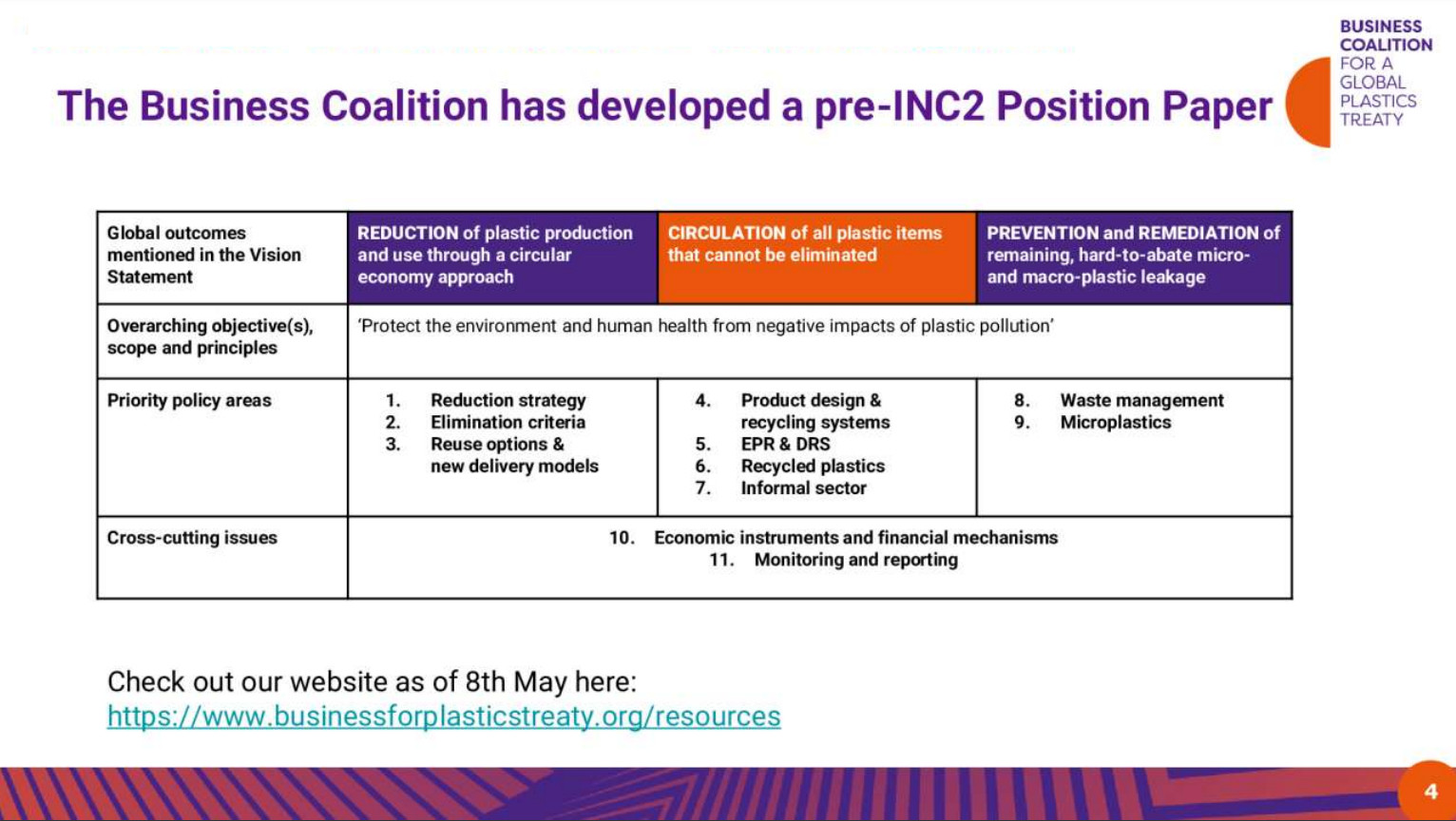
- The Business Coalition recognizes that the options paper is a good intermediate step that will facilitate discussions amongst the negotiators. It is encouraging that potential core options and control measures are outlined and many of them are in alignment with the Coalition’s Vision Statement.
- The options paper does not yet recognize the need to tailor control measures to specifics of different business sectors, as well as product applications. We hope that this will happen through the development of technical annexes. We recognize that the applications of plastic are numerous and is not possible to address everything at once, but some high-priority sectors could be addressed in the initial treaty negotiation.
Elements or options to be strengthened:
- Reuse and refill alternative delivery systems are particularly relevant to the world of consumer packaging, representing about forty per cent of plastic applications today. The Coalition is looking at an expansion of reuse and how it would be addressed in the treaty, particularly with options around reuse infrastructure going beyond the design measures, which deserve attention as systemic interventions to scale reuse and refill systems will be necessary. The Coalition is reflecting on whether this should be about national and international regulation, whether a category-by-category approach to reuse for different types of products should be employed or at what specific phase in timelines and standards would need to be applied to facilitate shared packaging infrastructure.
- Transform recyclability in practice and at scale. We need to look at how recyclability can be mandated by design and then move beyond recycling in practice and at scale.
- The language around extended producer responsibility is not as ambitious as we would hope for. Today, action programs are a set of guidelines that are not specific enough. We hope that this will become a fully-fledged annex in the future treaty. The current scale of the challenge in compliance sees a different number of national laws to be respected. This treaty offers us the opportunity to ultimately put in place harmonized legislation that will do the right thing for the environment and enable businesses to comply and be a partner in solutions.
Expectations for the Treaty
- The Business Coalition’s expectations for the negotiated treaty is for it to include legally binding global rules and measures that are going to drive change on a global scale. This will come through harmonized regulation, addressing reduction, circulation and prevention, along with remediation.
- We hope in INC-2 to see the request that will move to a zero-draft legal text before INC-3, building on the options paper and enhancing the understanding of elements that need to be strengthened, in particular, reuse, extended producer responsibility, and moving from design for recycling to actual recyclability and the need to differentiate by plastic application.
Youth Perspective
Zuhair Ahmed KOWSHIK | Global Focal Point, Children and Youth Major Group to UNEP
- In the post- covid context, in many countries, especially least-developed countries (LDCs) and low-middle-income countries, big portions of the population have been pushed into poverty. This has pushed a lot of children out of educational institutions and schools and forced many into waste picking for economic reasons.
- In Bangladesh, my country, 32 percent of kids have engaged in waste picking and are getting exposed to the worst effects of plastic pollution. This represents a violation of human rights, from education to living in a clean, healthy, and sustainable environment.
- Human rights should be the core of this treaty negotiations and for these, the Youth constituency demands that human rights are addressed in the objectives of the international legally binding instrument.
- The options paper contains mentions of the protection of human health and the environment. On behalf of the youth group, we demand delegates intervening during the negotiations to stress this in their speeches, as we all know that plastic pollution is a major threat to environmental human rights.
- The youth constituency is still critically reviewing the options paper and other documents and preparing our policy position for the second round of negotiations. The current perspectives agreed upon are:
-
- The future instrument must build on global targets because, in other MEAs employing nationally determined contributions that are not legally binding, implementation has not been as strong.
- The options paper focuses on strengthening waste management and improving the management infrastructure and for these, we demand dedicated grant-based funds for the developing countries and the LDCs.
- More attention and efforts must be placed on reducing fossil fuel and petrol subsidies.
- Extended producer responsibility should cover both producers and importers.
- One of the core obligations of the treaty should be addressing legacy plastic issues. Investments should be made in inventing new technologies to remove plastics from marine ecosystems and protect marine biodiversity from the harmful consequences of plastic pollution.
- The seventh possible core obligation mentioned in the options paper contains a note on the potential of reuse schemes for creating 1.4 million jobs globally, stressing the role of the treaty in creating green jobs. Young people could enjoy a portion of these benefits, thus ensuring that these jobs are just and sustainable and that youth entrepreneurship is facilitated are key.
- There should be minimum standards and a set of instructions for making national action plans ambitious and effective, with measures to put in place if countries fail to respect their NAPs commitments.
- Raising awareness and increasing the level of education of young people on the risks associated with single-use plastic and waste management is essential for leveraging broad support and implementation of the treaty.
- To ensure effective and broad youth participation in INC-2, six youth constituencies have come together and created the Global Youth Coalition on Plastic Pollution (GYCPP). The GYCPP is currently preparing its policy position for INC-2 and during the negotiation, it will inform member states and other stakeholders about it.
- Youth represents 35 percent of the global population. Ensuring their participation is not only just, but also essential for future implementation. We expect and request the host country and the organizers to support young people and aid their participation with VISA and financial support.
Science Perspective
Bethanie CARNEY ALMROTH | Professor at Gothenburg University | Member of the Steering Committee of the Scientists’ Coalition for an Effective Plastics Treaty
- The goal of the Scientists Coalition for an Effective Plastics Treaty is to achieve an effective global plastics treaty centred on and around evidence-based decision-making, building on UNEA resolution 5/14 and on the right to a clean, healthy and sustainable environment. The right to access knowledge and science is another human right the Scientists Coalition strongly supports.
- The SC’s sub-goals are mobilizing a diverse and international multidisciplinary network of scientists to engage with and provide evidence to government delegations throughout the treaty negotiations; and to identify, analyze and address biases and misunderstandings or misrepresentations that may be promoted in attempts to weaken the global framework.
- We have been working hard on gathering scientists, now having around 200 members from 45 countries on board, as we prioritize global and subject matter representation. We have broad expertise across natural and social sciences, and people representing different regions of the world where different problems might be evident.
- This group formed in a very grassroots manner from the scientist declaration, which was supporting resolution 5/14, and is focusing its work on supporting the development of the treaty.
- During this pre-negotiation period, Scientists part of the Coalition contributed by publishing ideas about what scientific evidence needs to be reflected in the treaty. For instance, this entails shifting from a marine-science-only perspective to one that addresses plastics through their life cycle from social, ecological and policy perspectives. Scientifically proven necessities for the treaty include upstream measures like a cap on production and phasing out of problematic chemicals in plastics.
- Chemical simplification and sustainable plastics design are pivotal measures that can make recycling a sustainable and functioning practice.
- At INC-1, held in Uruguay in 2022, The Scientists Coalition teamed up with other scientist groups, like the International Science Capital, to moderate the multistakeholder dialogue and to give feedback during the plenary. Our initial intention was to be present at an area for delegates to get in contact and ask their questions, as not all delegations have close contact with scientists and experts.
- During the interim period, the Scientists Coalition worked on different fronts:
- Reviewing the Compass report, raising issues with scoping of the documents, which were not as broad as we would have liked and not emphasizing enough system perspective.
- Participating in webinars, including the HAC webinar series.
- Engaging with government delegations on specific questions.
- Mobilizing to participate in INC-2 to help and support the delegates. Many scientists are struggling to get there because academic institutions cannot be accredited to UNEP as they do not fulfil either non-profit or non-governmental requirements. This does raise questions about transparency and potentially even credibility.
- Collaborating in working groups to answer specific questions raised by delegates in conversation, contributing to our work for national and global indicators from and monitoring reporting.
- Engaging in discussions around what a scientific advisory board could look like for this process and going forward in the future.
- Addressing issues of conflict of interest, which can potentially raise false solutions or lead us to unsustainable solutions and potentially greenwashing that reinforce the business-as-usual approach.
- Forty- two percent of the national submissions to the INC called for establishing a science body as no official one has yet been established, but we see the need for an interim science advisory- mechanism.
- The Scientistic Coalition has been filling this void informally, but this group would need to respond to information requests from the parties; provide peer reviews; feedback or relevant documentation and evidence-based decision-making; contribute scientific documents to the parties or the Secretariat at their request; and potentially suggest experts that can work in larger groups during the INC process.
- The composition of this group – which should be broad to cover the different aspects of the plastics problem from both natural and social sciences and include indigenous scientists as mandated by resolution 5/14 -; its mandate and funding are all to be determined, possibly starting the conversation during INC-2.
- There needs to be a discussion about what science-advisory mechanisms would look like in the treaty itself, beyond this negotiating process and whether that would be embedded into the treaty and if there would be a specific group dedicated specifically to the classics treaty or if it might be included under another group, for example, the Science Policy Panel on Chemical and Waste Prevention.
- Conflicts of interest are being addressed by the Scientists Coalition through disclosure statements to ensure no biases are introduced. There are a lot of techniques that have been used to muddy waters, slow down and delay action and challenge potential solutions. Treaty negotiators must be aware of this problem when considering proposed solutions and science.
- Our goal is to support the treaty negotiations with the best available science, and evidence for decision-making in this process.
David AZOULAY | Director of the Geneva Office and of the Environmental Health Program, CIEL
- The timeline and objective for this treaty are ambitious, therefore it is crucial to achieving substantive progress at INC-2.
- CIEL’s expectations for a meaningful negotiation session include:
- a working agreement on the objective of the treaty that respects the options paper, especially upholding objectives A (phasing out and/or reducing the supply of, demand for and use of
primary plastic polymers) and B (banning, phasing out and/or reducing the use of problematic and
avoidable plastic products) that put at the center considerations about health and environmental impact throughout the lifecycle of plastic; - highlighting that achieving circularity entails addressing also the invisible aspects of plastic pollution;
- a clear definition of what plastic pollution is. Among these, a relevant one defines plastic pollution as “broadly all emissions and risks arising from the production, use, and disposal of plastics”. Defining plastic pollution broadly will allow us to address the toxicity aspect; the impacts on workers who produce plastic; fence line communities who are exposed to a lot of impacts, rather than plastic products or legacy plastics alone;
- a fully operational rules of procedure and a functional bureau;
- an agreement on dates and locations for the next INCs;
- a clear mandate to prepare a zero-draft for discussions at INC-3, given to the chair of the process with support from the Secretariat;
- starting to rule out potential options.
- a working agreement on the objective of the treaty that respects the options paper, especially upholding objectives A (phasing out and/or reducing the supply of, demand for and use of
Reflections on the Options Paper
- It contains both strong and unfortunate elements. Some of the language used does not accurately reflect the language used in countries’ submissions. For example, some control measures were conflated with voluntary measures. That is unfortunate as we believe that the main focus should be on legally binding measures as articulated by the majority of the countries’ submissions.
- One way to strengthen the options presented in the paper is to insist on the upstream part of the treaty. Unless we reduce and cut the production of virgin plastic, we will fail at ending or even reducing plastic pollution.
- The references to limiting and ending fossil fuels and petrochemical subsidies that play a major role in the petrochemical build-out present in countries’ submissions were not sufficiently reflected in the options paper;
- Advanced versions of the paper should define a circularity and frame all the provisions that will avoid using false solutions.
- If at INC-2 a clear mandate for the development of the zero-draft is agreed upon, this will have to start ruling out options, focusing on mandatory and legally binding control measures, and identifying other intersessional work.
- For a successful treaty, intersessional work should not just be a task of the Secretariat. Other stakeholders should carry out work for the development of criteria to identify the most problematic monomers, chemicals, and all products that would be subject to control measures, as well as start collecting ideas for innovative financing mechanisms.
- Implementing this treaty will require very large amounts of new financing and we cannot rely on business as usual and donor countries to provide financing to implement this. We are going to need to develop innovative funding strategies for that, and we cannot wait until the last INC to develop this, or else we risk failing.
Felix WERTLI
For INC-2, it is essential to establish procedural aspects and decide on the locations and dates for the next INCs. It is necessary to further work to achieve control measures for the treaty to achieve this vision. That means having in place measures that allow us to make to act on plastic pollution in a reasonably short time.
The negotiation space must hail substantive progress. Agreeing on a mandate to develop a zero-draft by INC-3 will represent an important development from an options paper.
Final Remarks | What is the most important outcome expected from INC-2?
David AZOULAY | A clear mandate for the development of a zero-draft and the intersessional work, providing a clear logical structure for negotiators to engage specifically on the substance and on how to move forward for the next eighteen months.
Jodie ROUSSELL | A mandate for the zero-draft, including specification of some of the core objectives and annexes to be negotiated in the fall.
Bethanie CARNEY ALMROTH | A zero-draft with a clear mandate on obligations preferably, binding obligations focusing on upstream measures, and text on the science advisory mechanism, to ensure that we are basing our decisions on the best available science.
Zuhair AHMED-KOWSHIK | For human rights to be at the core mentioned there and also this global youth coalition is taken into consideration for partnerships.
H.E. Amb. Clara Manuela da Luz DELGADO JESUS | A clear mandate for a zero-draft for better negotiations in the upcoming INCs.
Hugo LEQUERTIER | A zero draft is one of the best outcomes that we would like to see at the end of INC-2, alongside convergence on some elements of the options paper.
Jyoti MATHUR-FILIPP | Agreement on the intersessional work agreed to be completed until INC-5, for example with the establishment of a legal group or an expert group and the definition of the dates for all three future meetings.
Felix WERTLI | A zero-draft is the core, and not only a zero-draft but one that contains legally bind rules that can allow us to fulfil the mandate of UNEA resolution 5/14.
Video
Livestreamed from International Environment House II.
Highlights
🟢#Live now!
Tune in for this #GENeva #BeatPlasticDialogue briefing on #PlasticsTreaty #INC2 on updates from the INC Secretariat, and perspectives, from Member States, youth, the private sector & scientific community.
▶️ https://t.co/QzOy42s84q pic.twitter.com/DTuCJ2g0py
— GENeva Environment Network (@GENetwork) April 27, 2023
Photos
Documents
Links
- Official website of the INC-2
- Scenario note for the Second Session of the INC Plastic Pollution
- Potential options for elements towards an international legally binding instrument
- Towards Plastic Pollution INC-2
- Geneva Beat Plastic Pollution Dialogues
- Plastics and the Environment
- International Cooperation on Plastic Pollution | Plastics and the Environment Series
- High Ambition Coalition to End Plastic Pollution
- Business Coalition for a Global Plastics Treaty
- Scientists’ Coalition for an Effective Plastics
Credits
Maison de l’UNESCO © UNESCO

